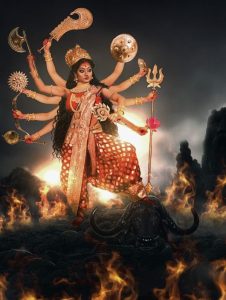In My Meditation Today: God’s love is not a soft, gentle, fluffy Santa Claus emotion. It is fierce and unyielding. She does not flinch while stabbing you in the gut or hitting you with a metaphorical 2X4 if that is what is needed to wake you up. She does this as she breaks your fall and holds you broken and bruised, waiting with infinite patience and unflinching faith to welcome you healed, whole, and fully established in your power on the other side of what seemed like an impassable chasm.
The Grand Story of the Divine Mother is told in three parts. Each part describes a battle between good and evil, and most often, the story is interpreted as the forces of good and evil external to us. However, a more helpful interpretation for me is that it represents the battle between my basest instincts and my highest potential.

The battles are bloody and gory because a battle to live from your highest potential is hard, ugly, and metaphorically bloody and gory. We are coming down to the last two episodes of the Grand Story of the Divine Mother. With Rakthabija, Shumbha and Nishumbha have lost their last great general. So the fight is now between the two brothers and what is left of their army.
In this chapter, the battles alternate between Nishumbha and Shumbha.
At first, both of them rush at her showering her with arrows. Devi is unfazed. She blocks all the weapons coming her way and drops Nishumbha unconscious to the ground with a volley of arrows. Seeing his brother knocked to the ground, Shumbha is enraged and rushes towards the Goddess. This battle continues with Shubha rising when Nishumbha is on the ground and Nishumbha rising as Shumbha falls unconscious. Then, after a long battle with Nishumbha, Devi ends it by piercing him through the heart. The next chapter describes the slaying of Shumbha and marks the end of the central part of the Myth.
Nishumbha and Shumbha are shown to be very closely allied in the description of this battle. As one falls, the other rises. Nishumbha represents “mamata” or attachment (incidentally, the word used to describe a mother’s love for her child). Shumbha is ‘ ‘ahankara’ or sense of self – more correctly (commonly translated as ‘EGO’,)- the sense of a separate self. Shumbha is everything that makes one feel separate from all that is.
Nishumbha represents our attachment to everything that Shumbha uses to establish that separateness – gender, nationality, physical appearance, likes and dislikes, family roles, etc. These are powerful forces within us, and consequently, the myth’s description of the two brothers does not depict the “demons” as ugly, pathetic, abhorrent creatures. It gives them their due.
“ He shone forth and filled the entire sky with his eight incomparable arms.”
It acknowledges their power.
The sense of separateness and one’s attachment to all of these characteristics that we use to distinguish ourselves from another maintains the illusion of separation from all that is.
So when Devi pierces and penetrates Nishumbha’s heart, she kills Shumbha’s attachment to his separate identity.
As Devadatta Kali says as she describes this slaying in ” In Praise of Goddess. The Devimahatmya and It’s Meaning”,
“Sometimes spiritual awakening dawns only after the experience of great pain, a severe wounding of the heart.”
Unlike earthly mothers like me, Devi can do that because she rests in the truth that Spirit is eternal. So it is that she does not flinch while stabbing you in the gut or hitting you with a metaphorical 2X4 if that is what is needed to wake you up. She does this as she breaks your fall and holds you broken and bruised, waiting with infinite patience and unflinching faith to welcome you healed, whole, and fully established in your power on the other side of what seemed like an impassable chasm.
Let’s talk about reducing the sense of separateness and expressing your divinity.
